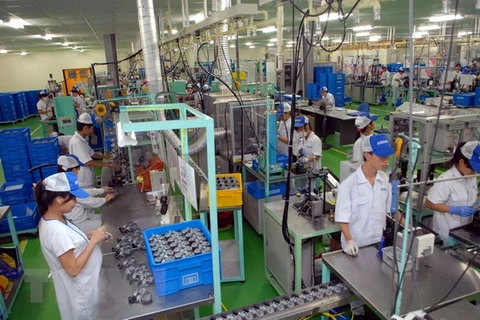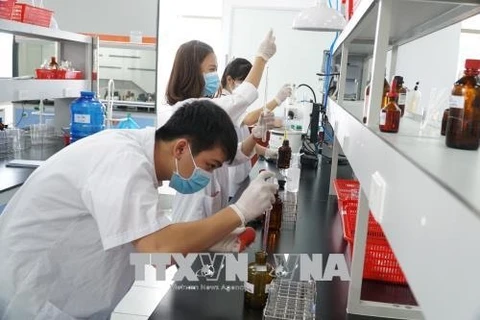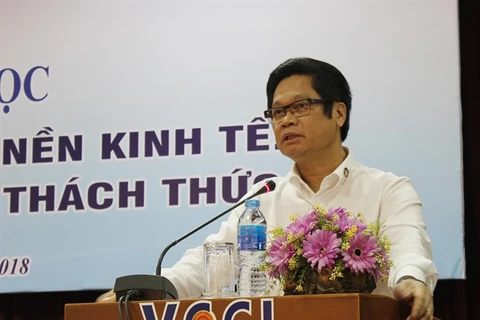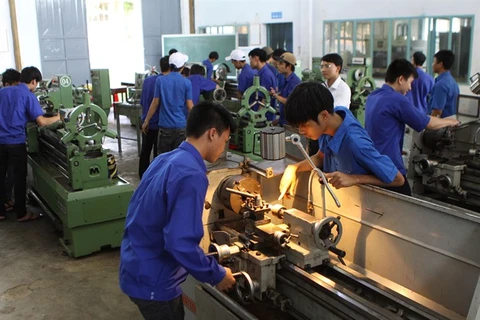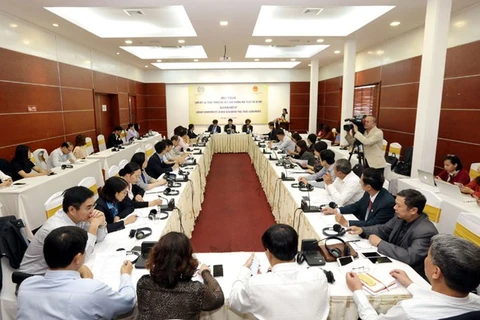Hanoi (VNA) – Creating jobs and improving workers’ skills in the context of international integration are important goals for Vietnam, which holds a large workforce, said Deputy Minister of Labour, Invalids, and Social Affairs (MoLISA) Doan Mau Diep.
He made the statement while attending the conference on “Labour Market Policy and Upskilling Needs in Context of International Integration” jointly held by the MoLISA, the Swiss Federal Department of Economic Affairs, Education, and Research, and the International Labour Organisation (ILO).
The development of the labour market will make significant contributions to forming market economy institutions, he said, underlining that Vietnamese labour market policies are being currently being completed.
More people have joined the labour force over the past year, with the proportion of agricultural labourers among the total national workforce is estimated at around 40 percent. Meanwhile, the percentage of people within the working age remain high at 76 percent of the local population. Other positive developments in the labour market include improvements in workers’ income and working conditions, as well as the narrowing gap between male and female payment.
However, Diep described that unqualified workers in the agricultural sector and the significant percentage of people engaged in unskilled work are some of the shortcomings of the labour market.
Citing labour productivity as one of the challenges facing Vietnam’s sustainable development, Swiss Ambassador to Vietnam Beatrice Maser said that both state-owned and private companies should make efforts to improve workers’ skills in response to radical changes in technologies.
Free trade agreements like the Comprehensive and Progressive Agreement for Trans-Pacific (CPTPP) and the European Union-Vietnam Free Trade Agreement (EVFTA) will accelerate the automation and digitalisation processes, imposing new requirements for the labour force.
In that context, Vietnam is working to finalise labour regulations and a labour relation system towards creating sustainable jobs for all, said participants at the conference.
With three working sessions, the conference discussed Vietnam’s labour market policies and focused on experience sharing between Vietnam and Switzerland in labour market institutions.
The attendants said that Vietnamese business should themselves build strategies and a risk management system, improve the quality of the workforce, and set up a rational wage system to ensure that both employers and employees work for mutual benefits.–VNA
He made the statement while attending the conference on “Labour Market Policy and Upskilling Needs in Context of International Integration” jointly held by the MoLISA, the Swiss Federal Department of Economic Affairs, Education, and Research, and the International Labour Organisation (ILO).
The development of the labour market will make significant contributions to forming market economy institutions, he said, underlining that Vietnamese labour market policies are being currently being completed.
More people have joined the labour force over the past year, with the proportion of agricultural labourers among the total national workforce is estimated at around 40 percent. Meanwhile, the percentage of people within the working age remain high at 76 percent of the local population. Other positive developments in the labour market include improvements in workers’ income and working conditions, as well as the narrowing gap between male and female payment.
However, Diep described that unqualified workers in the agricultural sector and the significant percentage of people engaged in unskilled work are some of the shortcomings of the labour market.
Citing labour productivity as one of the challenges facing Vietnam’s sustainable development, Swiss Ambassador to Vietnam Beatrice Maser said that both state-owned and private companies should make efforts to improve workers’ skills in response to radical changes in technologies.
Free trade agreements like the Comprehensive and Progressive Agreement for Trans-Pacific (CPTPP) and the European Union-Vietnam Free Trade Agreement (EVFTA) will accelerate the automation and digitalisation processes, imposing new requirements for the labour force.
In that context, Vietnam is working to finalise labour regulations and a labour relation system towards creating sustainable jobs for all, said participants at the conference.
With three working sessions, the conference discussed Vietnam’s labour market policies and focused on experience sharing between Vietnam and Switzerland in labour market institutions.
The attendants said that Vietnamese business should themselves build strategies and a risk management system, improve the quality of the workforce, and set up a rational wage system to ensure that both employers and employees work for mutual benefits.–VNA
VNA

